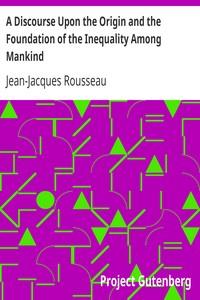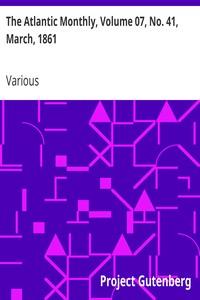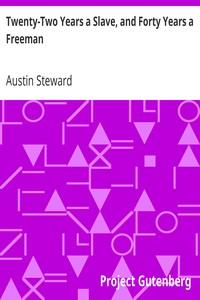|
|
Read this ebook for free! No credit card needed, absolutely nothing to pay.Words: 29923 in 5 pages
This is an ebook sharing website. You can read the uploaded ebooks for free here. No credit cards needed, nothing to pay. If you want to own a digital copy of the ebook, or want to read offline with your favorite ebook-reader, then you can choose to buy and download the ebook.

: A Discourse Upon the Origin and the Foundation of the Inequality Among Mankind by Rousseau Jean Jacques - Political science; Natural law; Equality@FreeBooksTue 06 Jun, 2023 A Discourse Upon The Origin And The Foundation Of The Inequality Among Mankind INTRODUCTORY NOTE Jean Jacques Rousseau was born at Geneva, June 28, 1712, the son of a watchmaker of French origin. His education was irregular, and though he tried many professions--including engraving, music, and teaching--he found it difficult to support himself in any of them. The discovery of his talent as a writer came with the winning of a prize offered by the Academy of Dijon for a discourse on the question, "Whether the progress of the sciences and of letters has tended to corrupt or to elevate morals." He argued so brilliantly that the tendency of civilization was degrading that he became at once famous. The discourse here printed on the causes of inequality among men was written in a similar competition. He now concentrated his powers upon literature, producing two novels, "La Nouvelle Heloise," the forerunner and parent of endless sentimental and picturesque fictions; and "Emile, ou l'Education," a work which has had enormous influence on the theory and practise of pedagogy down to our own time and in which the Savoyard Vicar appears, who is used as the mouthpiece for Rousseau's own religious ideas. "Le Contrat Social" elaborated the doctrine of the discourse on inequality. Both historically and philosophically it is unsound; but it was the chief literary source of the enthusiasm for liberty, fraternity, and equality, which inspired the leaders of the French Revolution, and its effects passed far beyond France. His most famous work, the "Confessions," was published after his death. This book is a mine of information as to his life, but it is far from trustworthy; and the picture it gives of the author's personality and conduct, though painted in such a way as to make it absorbingly interesting, is often unpleasing in the highest degree. But it is one of the great autobiographies of the world. During Rousseau's later years he was the victim of the delusion of persecution; and although he was protected by a succession of good friends, he came to distrust and quarrel with each in turn. He died at Ermenonville, near Paris, July 2, 1778, the most widely influential French writer of his age. The Savoyard Vicar and his "Profession of Faith" are introduced into "Emile" not, according to the author, because he wishes to exhibit his principles as those which should be taught, but to give an example of the way in which religious matters should be discussed with the young. Nevertheless, it is universally recognized that these opinions are Rousseau's own, and represent in short form his characteristic attitude toward religious belief. The Vicar himself is believed to combine the traits of two Savoyard priests whom Rousseau knew in his youth. The more important was the Abbe Gaime, whom he had known at Turin; the other, the Abbe Gatier, who had taught him at Annecy. QUESTION PROPOSED BY THE ACADEMY OF DIJON What is the Origin of the Inequality among Mankind; and whether such Inequality is authorized by the Law of Nature? A DISCOURSE UPON THE ORIGIN AND THE FOUNDATION OF THE INEQUALITY AMONG MANKIND 'Tis of man I am to speak; and the very question, in answer to which I am to speak of him, sufficiently informs me that I am going to speak to men; for to those alone, who are not afraid of honouring truth, it belongs to propose discussions of this kind. I shall therefore maintain with confidence the cause of mankind before the sages, who invite me to stand up in its defence; and I shall think myself happy, if I can but behave in a manner not unworthy of my subject and of my judges. I conceive two species of inequality among men; one which I call natural, or physical inequality, because it is established by nature, and consists in the difference of age, health, bodily strength, and the qualities of the mind, or of the soul; the other which may be termed moral, or political inequality, because it depends on a kind of convention, and is established, or at least authorized, by the common consent of mankind. This species of inequality consists in the different privileges, which some men enjoy, to the prejudice of others, such as that of being richer, more honoured, more powerful, and even that of exacting obedience from them. Free books android app tbrJar TBR JAR Read Free books online gutenberg More posts by @FreeBooks
: The Atlantic Monthly Volume 07 No. 41 March 1861 A Magazine of Literature Art and Politics by Various - American periodicals The Atlantic Monthly@FreeBooksTue 06 Jun, 2023

: Punch or the London Charivari Volume 156 Jan. 8 1919 by Various - English wit and humor Periodicals Punch@FreeBooksTue 06 Jun, 2023
|
Terms of Use Stock Market News! © gutenberg.org.in2025 All Rights reserved.






